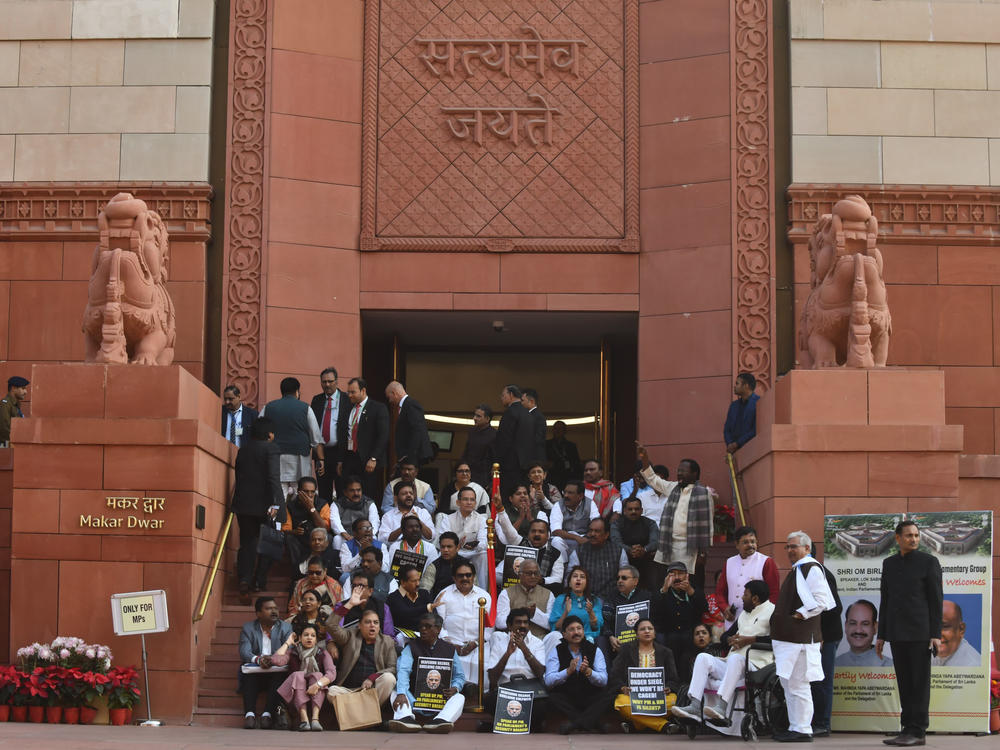Section Branding
Header Content
India's Parliament votes on key bills with over 140 opposition members suspended
Primary Content
MUMBAI, India — India's Parliament voted on a crime bill and other legislation on Wednesday, even though dozens of opposition legislators were not present.
It was the latest in a week of turmoil in Indian politics, which started with smoke bombs at Parliament and the suspension of more than 140 opposition lawmakers.
During a Dec. 13 session in Parliament, two protesters jumped from the visitors' gallery onto the floor of the legislature, set off yellow smoke canisters and shouted slogans against the government. Outside the chambers, two more protesters set off smoke canisters and shouted similar slogans. Police arrested the demonstrators along with two accomplices, according to news reports.
The same day, a member of the opposition tweeted a photo that he claimed showed the protesters had entered Parliament with an invitation from a legislator belonging to the governing Bharatiya Janata Party, or BJP.
The BJP has not responded to that allegation. But one of its leader, Amit Malviya, accused the protesters who breached parliament of being "linked" to the opposition Congress party and communists.
Opposition legislators have demanded that Prime Minister Narendra Modi and Home Minister Amit Shah explain to Parliament how protesters managed to enter the building — an incident made all the more chilling because it occurred on the anniversary of a deadly 2001 attack on Parliament.
But the prime minister and Shah, considered the second most powerful person in Indian government, have not responded.
Instead, the speakers of India's two chambers of Parliament suspended 143 members of the opposition for protesting and defying parliamentary norms.
"This is Murder of Democracy in India(MODI) at work!" the Congress party's general secretary, Jairam Ramesh, who was suspended from Parliament, wrote on X, formerly Twitter.
"At this point, unfortunately, we have to start writing obituaries for parliamentary democracy in India," another suspended lawmaker, Congress party member Shashi Tharoor, told news outlet ANI.
It's not uncommon for legislators to be suspended from the Indian Parliament on grounds of unruly behavior. But such numbers appear unprecedented. Local news media have reported that the last record was in 1989, when 63 legislators were suspended for a week.
On Wednesday, the suspensions prevented nearly a quarter of all elected legislators from debating or voting on several key bills. By evening, the lower house of Parliament had approved bills on criminal justice reform and telecom services.
The Parliament's remaining sittings for 2023 end this week, and the suspended legislators will not be able to attend them.
"There is no rule that prevents the ruling party from passing laws in absence of opposition," says Jagdeep Chhokar, founder of the Association for Democratic Reforms, a nongovernmental advocacy organization. "But it is a moral responsibility of the ruling party to ensure the presence of opposition. Without them, you cannot represent the whole country."
An analysis by the news website The Wire found that the suspended legislators represented nearly 140 million voters.
Critics say under Prime Minister Modi, India has seen a dramatic erosion of democracy, from stifling the press, bullying the judiciary and persecuting minorities. Since 2021, the U.S.-based Freedom House has downgraded Indian democracy from "free" to "partly free."
"India is at a dangerous, delicate stage," says Chhokar. "There's a lack of maturity on both sides — both the government and the opposition say the other side started it first. But this is not a school fight but the parliament. We can no longer claim that we're a vibrant democracy, even if the largest."
Copyright 2023 NPR. To see more, visit https://www.npr.org.

